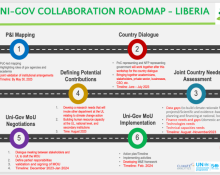The joint UNDP-UNEP National Adaptation Plan Global Support Programme (NAP-GSP), funded by the Global Environment Facility (GEF), has assisted over 60 least developed and developing countries in identifying technical, institutional and financial needs to integrate climate change adaptation into medium and long-term national planning and financing. The programme continues to build on the success of the NAP-GSP through the GEF approved UNI-LEAD project that is being implemented by UNEP and executed by START International.
The overall goal of the project is to strengthen capacities of Least Developed Countries (LDCs) to achieve scaled up and effective climate change adaptation by fostering sustained in-country technical services for project development, policy mainstreaming and the creation of an enabling environment for climate change adaptation. Strengthening capacities within LDCs to access climate finance is critically important for accelerating adaptation efforts.
To achieve this goal, the project will work closely with the Least Developed Countries Group (LDC Group) and its subsidiary organization, the Least Developed Countries Universities Consortium on Climate Change (LUCCC). The main mechanism for implementing the project will be through capacity building and institutional strengthening through activities at LUCCC member universities.
The project includes three mutually-supporting components aimed at enhancing coordination and cooperation among LDC universities and also for creating a strong foundation for the LDC-based technical services providers. The first component will consist of capacity development and institutional strengthening actions for all 15 LUCCC members, which will prioritize skill building that responds to the identified needs of LDC governments with respect to climate change adaptation policy mainstreaming and project development. The second tier of this component will involve providing more comprehensive support to five of the LUCCC universities to establish thinktanks within their universities.
The project’s second component will serve as a catalytic proof-of-concept by providing support to the LDC thinktanks to produce demand-led technical products that provide decision-support and policy-relevant information to the LDC governments in relation to climate change adaptation policy development and project design tasks. The project will provide grants to support the development of the initial technical products, which will provide an opportunity for the LDC thinktanks to hone their procedures and services, ultimately demonstrating the utility of the LDC thinktanks’ role as technical service providers to LDC governments.
The project’s third component will aim to capture the lessons learned from the establishment of the LDC thinktanks and will create the enabling conditions so that similar thinktanks can be established in additional LUCCC members and LDCs, thus expanding the network of thinktanks. This outcome will be achieved by sharing of lessons learned and success stories, and by providing specific guidance and advice for establishing new LDC thinktanks from the experience of the five pilot thinktanks.
Stakeholder Response and Grievance Redress Mechanism
The project aims to be stakeholder responsive and relevant. For any perceived concerns and negative impacts caused by the project to the stakeholders, the project team, government, the UNEP, and the donor are willing to hear and address them in an impartial and transparent manner. Complaints can be sent to the UNEP-IOSSR directly by completing the UNEP Online Project Concern Form, which is available both online and PDF format. (The Form is available in English, Arabic, Chinese, French, Russian or Spanish.) However, submission in local languages is welcome. The form can be emailed or mailed to IOSSR. They can also be reached by telephone.
Independent Office for Stakeholder Safeguard-related Response (IOSSR) & Director of Corporate Service Division
UNEP
P.O. Box 30552, 00100
Nairobi, Kenya
Tel: +254 709 023 421 / +254 207 626 711



